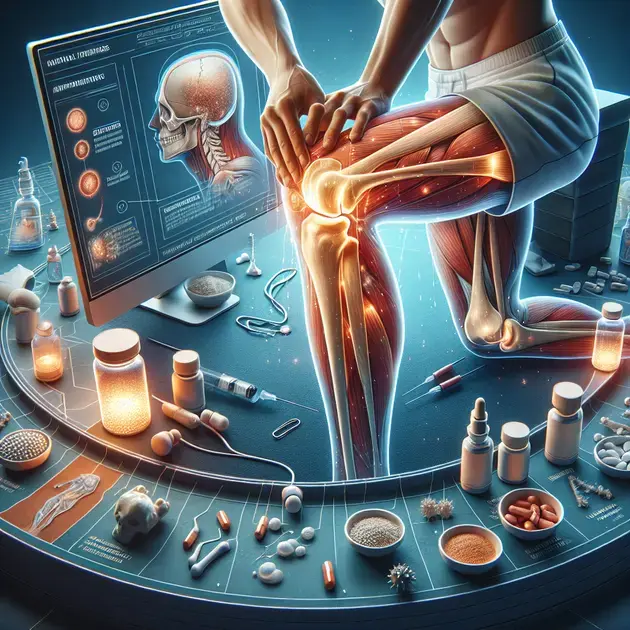Are you searching for effective strategies to find relief for knee pain? Look no further! In today’s fast-paced world, many individuals are experiencing discomfort in their knees due to various reasons such as injuries, arthritis, or simply overuse. Fortunately, there are several proven methods that can help ease the pain and improve your quality of life.
When it comes to addressing knee pain, it’s essential to explore different approaches to determine what works best for your unique situation. From lifestyle changes and exercise routines to medical treatments and alternative therapies, the key is to find a combination of strategies that provide you with the most significant relief possible. Stay tuned as we dive deeper into effective ways to alleviate knee discomfort and get you back on track to a pain-free lifestyle.
Natural Remedies for Knee Pain Relief
Dealing with knee pain can be challenging, but there are several natural remedies that can help alleviate discomfort and improve mobility. Incorporating a combination of exercise and stretching routines, as well as exploring medical treatments and alternative therapies, can provide relief and promote healing.
Incorporating Exercise and Stretching Routines
Regular exercise is key to maintaining healthy knees and reducing pain. Low-impact activities such as swimming, cycling, and walking can help strengthen the muscles around the knee joint without causing additional stress. Simple stretching exercises can also improve flexibility and range of motion, reducing stiffness and discomfort.
One effective exercise for knee pain relief is the straight leg raise. To perform this exercise, lie on your back with one knee bent and the other leg straight. Slowly raise the straight leg to the height of the bent knee, then lower it back down. Repeat this motion 10-15 times on each leg.
Another beneficial stretching routine is the quad stretch. Stand upright and bend one leg back, grasping your ankle with your hand. Hold this position for 30 seconds, feeling the stretch in the front of your thigh. Switch legs and repeat the stretch on the other side.
Utilizing apps like “MyFitnessPal” or websites like “Healthline” can provide guided exercise routines and stretching techniques specifically designed for knee pain relief. These resources offer detailed instructions and demonstrations to ensure proper form and technique.
By incorporating these exercise and stretching routines into your daily routine, you can strengthen the muscles supporting your knees, improve flexibility, and reduce pain and discomfort over time.
Exploring Medical Treatments and Alternative Therapies
In addition to exercise and stretching, exploring medical treatments and alternative therapies can offer additional relief for knee pain. Consulting with a healthcare provider is essential to determine the most appropriate treatment plan based on the underlying cause of the pain.
Medical treatments such as physical therapy, corticosteroid injections, and in severe cases, surgery, may be recommended to address chronic knee pain. Physical therapy sessions can help improve strength and flexibility, while corticosteroid injections can provide temporary relief from inflammation and discomfort.
Alternative therapies like acupuncture, massage therapy, and herbal supplements can also be beneficial in managing knee pain. Acupuncture can help restore balance in the body and alleviate pain, while massage therapy can reduce muscle tension and improve circulation in the affected area.
Websites like “WebMD” and apps like “Headspace” offer valuable information on medical treatments and alternative therapies for knee pain relief. These resources provide insight into various treatment options, including potential benefits and side effects.
By exploring a combination of medical treatments and alternative therapies, individuals with knee pain can effectively manage their symptoms and improve their overall quality of life.
Strategies for Managing Chronic Knee Pain
Chronic knee pain can be debilitating and have a significant impact on daily life. However, there are several strategies you can implement to help manage and alleviate this pain. One effective strategy is to engage in regular low-impact exercise, such as swimming or cycling, to strengthen the muscles surrounding the knee joint. This can help provide support and stability to the knee, reducing pain and discomfort. Additionally, maintaining a healthy weight is crucial for managing chronic knee pain, as excess weight can put added pressure on the knee joint.
Another key strategy for managing chronic knee pain is to use hot and cold therapy. Applying a heating pad or warm compress to the knee can help relax the muscles and improve blood flow, while using an ice pack can help reduce inflammation and numb the pain. Alternating between hot and cold therapy can provide relief from knee pain. Additionally, practicing good posture and body mechanics can help alleviate knee pain by reducing strain on the joint.
Incorporating relaxation techniques, such as deep breathing exercises or mindfulness meditation, can also be beneficial for managing chronic knee pain. Stress and tension can exacerbate pain, so learning how to relax both the mind and body can help reduce knee pain and improve overall well-being. Additionally, using assistive devices, such as knee braces or orthotic inserts, can provide support and stability to the knee joint, reducing pain and improving mobility.
Finally, it is important to work closely with a healthcare provider to develop a comprehensive treatment plan for managing chronic knee pain. This may include physical therapy, medications, or other interventions tailored to your specific needs. By following these strategies and working with your healthcare team, you can effectively manage chronic knee pain and improve your quality of life.
Tips for Preventing Future Knee Injuries
Preventing knee injuries is essential for maintaining healthy and pain-free knees in the long term. One of the key tips for preventing future knee injuries is to always warm up before engaging in physical activity. This can help prepare the muscles and joints for exercise, reducing the risk of strains or sprains. Additionally, incorporating strength training exercises that target the muscles around the knee, such as squats and lunges, can help improve stability and prevent injuries.
Another important tip for preventing knee injuries is to wear appropriate footwear for the activity you are engaging in. Proper footwear can provide support and cushioning for the feet and knees, reducing the risk of injury. It is also important to listen to your body and avoid pushing through pain during exercise. If you experience any discomfort or pain in the knees, it is important to stop and rest to prevent further injury.
Maintaining a healthy lifestyle, including a balanced diet and regular exercise, is key to preventing future knee injuries. Eating a diet rich in nutrients that support joint health, such as omega-3 fatty acids and anti-inflammatory foods, can help reduce inflammation and support the health of the knee joints. Staying hydrated and maintaining a healthy weight can also help reduce the risk of knee injuries.
Using proper form and technique during physical activities is crucial for preventing knee injuries. This includes using the correct body mechanics and posture to reduce strain on the knees. If you are unsure about the proper form for a specific exercise, consider working with a certified fitness trainer to ensure you are performing the movements correctly. By following these tips and incorporating injury prevention strategies into your routine, you can reduce the risk of future knee injuries and maintain healthy knees for years to come.
Nutrition and Supplements for Joint Health
Proper nutrition and the use of supplements can play a significant role in supporting joint health and reducing the risk of knee pain and injuries. One key nutrient for joint health is omega-3 fatty acids, which have anti-inflammatory properties that can help reduce inflammation in the joints, including the knees. Incorporating foods rich in omega-3s, such as salmon, chia seeds, and walnuts, into your diet can help support the health of your knee joints.
In addition to omega-3 fatty acids, incorporating foods rich in antioxidants, such as fruits, vegetables, and green tea, can help reduce oxidative stress and inflammation in the body, supporting overall joint health. You may also consider taking supplements such as glucosamine and chondroitin, which are known to support joint health and reduce pain and stiffness in the knees.
Maintaining a balanced diet that includes a variety of nutrient-dense foods is important for supporting joint health and preventing knee pain. Foods rich in vitamin C, such as citrus fruits and bell peppers, can help support collagen production in the joints, while foods high in vitamin D, such as fatty fish and fortified dairy products, can help maintain bone health and reduce the risk of osteoarthritis.
In addition to proper nutrition, staying hydrated is essential for joint health, as water helps lubricate the joints and prevent stiffness. Incorporating these nutrition and supplement strategies into your daily routine can help support the health of your knee joints and reduce the risk of pain and injuries in the future.
Conclusion
In conclusion, managing chronic knee pain requires a multi-faceted approach that includes regular low-impact exercise, maintaining a healthy weight, and utilizing hot and cold therapy. These strategies help provide support, reduce inflammation, and alleviate pain in the knee joint. Additionally, incorporating relaxation techniques and using assistive devices can further enhance the management of chronic knee pain, leading to improved well-being and mobility.
Furthermore, preventing future knee injuries is essential for long-term knee health. Tips such as warming up before physical activity, wearing proper footwear, and listening to your body can help prevent strains and sprains. A healthy lifestyle with balanced nutrition, hydration, and appropriate exercise can support joint health and reduce the risk of knee injuries. Using correct form during physical activities is crucial in preventing knee injuries, and seeking guidance from certified fitness trainers can ensure proper technique.
Moreover, nutrition and supplements play a vital role in supporting joint health and reducing the risk of knee pain and injuries. Incorporating foods rich in omega-3 fatty acids, antioxidants, vitamin C, and vitamin D can help maintain the health of knee joints. Additionally, staying hydrated is key in preventing stiffness and supporting joint lubrication. By following these strategies and incorporating them into daily routines, individuals can effectively manage chronic knee pain, prevent future injuries, and support overall knee health for the long term.

